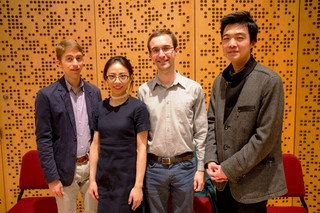|
Back
Arts and Crafts New York
Alice Tully Hall
04/03/2017 -
Ross Griffey: Essay
Chen Yihan: Dust
Theo Chandler: Songs from “Brooches”
Shuci Wang: Abyss
Annaliese Klenetsky (Soprano), Kara Dugan (Mezzo-soprano)
The Juilliard Orchestra, Jeffrey Milarsky (Conductor)

R. Griffey, S. Wang, T. Chandler, C. Yihan (© Darren Caroll)
“The only question a composer ought always to ask of the music he is writing: Is this music that I want to hear and that I could not otherwise hear?”
Composer Edward Cone (1917-2004)
Like Ecole Nationale Supérieure des Beaux-Arts or the Royal College of Arts in the fine arts, Juilliard has the duty, responsibility and highest-quality staff to turn out musicians who will graduate to adorn the finest orchestras and conservatories in the world. That goes for performers and composers.
Performers are easily quantifiable. Violinists or percussionists can either handle the music, or they can’t. But composers? Ah, that’s a different story. For Juilliard is so brilliant in its teaching methods that composing graduates can pen their pieces with unmatched facility. Whether for piccolo solo or Mahler-sized orchestra, A Juilliard graduate works contrapuntal brilliance, with color, with thematic complexity, textural depth and clear appeal.
Which is not necessarily sufficient.
All of which is a long-winded introduction to the four world premieres by Juilliard graduate students performed last night. The performances couldn’t be improved upon. Jeffrey Milarsky’s baton can lead any score, the Juilliard Orchestra, while young, has those aforementioned terrific performing artists. As for the quartet of orchestral pieces, they sounded –sounded–professional and well-crafted.
Was that really enough? Listening to Ross Griffey’s Essay for Orchestra, I was entranced not only by the gorgeous instrumentation, but by those secret little homages to Samuel Barber. The composer admitted that his title came from Barber’s Essays, so we also had oboe and clarinet lines which clearly quoted from Barber’s style. Yet they were only part of an orchestra which deftly worked its way, concerto style, from soloists to full ensemble. Mr. Griffey knew what he was doing through all three continuous sections. His short brass interludes, the frenzied ensemble work, and its unexpected low-key ending all were endearing.
Most endearing of all is that, just when I had stopped marveling at the music and began to think of “how he did it”, he finished. Mr. Griffey does understand the value of not saying more than he has to. And that indeed rare.
I had the same feeling with Shuci Wang’s Abyss, another work of stunning craftsmanship. Again, a tertiary construction which any student–and most professionals–would be proud to have performed, with its violence, its solitude, its frenetic orchestral passages. Her study with Christopher Rouse has produced a composer who understands so well her orchestra and isn’t afraid to let it blazon out. Yet once again, though happy to hear it and with utmost esteem for Ms. Wang, I had no great desire to hear it again.
Two works, though, were outstanding. I originally wasn’t anticipating greatness from pianist-composer Chen Yihan. The others on the program described their music with non-technical but specific musical analysis. Mr. Yihan wrote with amorphous rhapsodic words about snowflakes and flowers and blossoming.
Ho-hum...
His Dust transcended that, if only because he had a single idea, and the music went unashamedly forward. Dust could have been named Sea Pictures, for this was a maritime picture. The strings and low brass and high screeching winds produced an image of a boat alone in the sea. Not a particularly pretty boat either. Like the tankers I used to work on many years ago, Mr. Yihan produced a lone big ship, creaking and hauling on a wide-open Sulu Sea, the carrion birds screaming above.
Dust didn’t quite have the complexity of the first two works, but the music was emotional, it seemed to come not from the student composer but an artist who understood (as Mr. Cone wrote above) that he had to write it.

K. Dugan, A. Klenetsky (© Juilliard)
Only one work last night had a singularity and a memorability. Theo Chandler took four poems from Zeke Greenwald’s Brooches, setting them for orchestra, and two female singers. In theory, Misses Klenetsky and Dugan were soprano and mezzo-soprano, but their notes were literally of the same high range.
Literal meaning that they repeated each other, they ran notes around each other, they sung in simple thirds, or let their lines dangle and uplift, going against each other, soaring over each other. All of this with minimal (but deft) orchestral accompaniment.
And yet not once did I feel that Mr. Chandler was trying to show his originality, his craftsmanship, his learning. Mr. Greenwald’s poems were the inspiration, and Mr. Chandler produced two gorgeous singers (also from Juilliard) whose dappled lines evoked fantasy, ardor and this listener’s longing to hear far more from this compelling composer.
Harry Rolnick
|